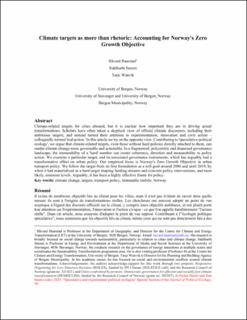Climate targets as more than rhetoric: Accounting for Norway’s Zero Growth Objective
| dc.contributor.author | Haarstad, Håvard | |
| dc.contributor.author | Sareen, Siddharth | |
| dc.contributor.author | Wanvik, Tarje Iversen | |
| dc.date.accessioned | 2023-06-13T11:26:06Z | |
| dc.date.available | 2023-06-13T11:26:06Z | |
| dc.date.created | 2023-01-31T08:55:17Z | |
| dc.date.issued | 2023 | |
| dc.identifier.issn | 1073-0451 | |
| dc.identifier.uri | https://hdl.handle.net/11250/3071113 | |
| dc.description.abstract | Climate-related targets for cities abound, but it is unclear how important they are in driving actual transformations. Scholars have often taken a skeptical view of official climate discourses, including their ambitious targets, and instead turned their attention to experimentation, innovation and civic action – colloquially termed 'real action.' In this article we try on the opposite view. Contributing to 'speculative political ecology', we argue that climate-related targets, even those without hard policies directly attached to them, can render climate change more governable and actionable. In a fragmented, polycentric and dispersed governance landscape, the immutability of a 'hard' number can create coherence, direction and measurability to policy action. We examine a particular target, and its associated governance instruments, which has arguably had a transformative effect on urban policy. Our empirical focus is Norway's Zero Growth Objective in urban transport policy. We follow the target from its first formulation as a soft goal around 2006 and until 2019, by when it had materialized as a hard target shaping funding streams and concrete policy interventions, and most likely, emission levels. Arguably, it has been a highly effective frame for policy. | en_US |
| dc.language.iso | eng | en_US |
| dc.publisher | University of Arizona Libraries | en_US |
| dc.rights | Navngivelse 4.0 Internasjonal | * |
| dc.rights.uri | http://creativecommons.org/licenses/by/4.0/deed.no | * |
| dc.title | Climate targets as more than rhetoric: Accounting for Norway’s Zero Growth Objective | en_US |
| dc.type | Journal article | en_US |
| dc.type | Peer reviewed | en_US |
| dc.description.version | publishedVersion | en_US |
| cristin.ispublished | true | |
| cristin.fulltext | original | |
| cristin.qualitycode | 1 | |
| dc.identifier.doi | 10.2458/jpe.4691 | |
| dc.identifier.cristin | 2119318 | |
| dc.source.journal | Journal of political ecology | en_US |
| dc.source.pagenumber | 542–557 | |
| dc.identifier.citation | Journal of political ecology. 2023, 30 (1), 542–557. | en_US |
| dc.source.volume | 30 | en_US |
| dc.source.issue | 1 | en_US |
Tilhørende fil(er)
Denne innførselen finnes i følgende samling(er)
-
Department of Geography [630]
-
Registrations from Cristin [9558]

